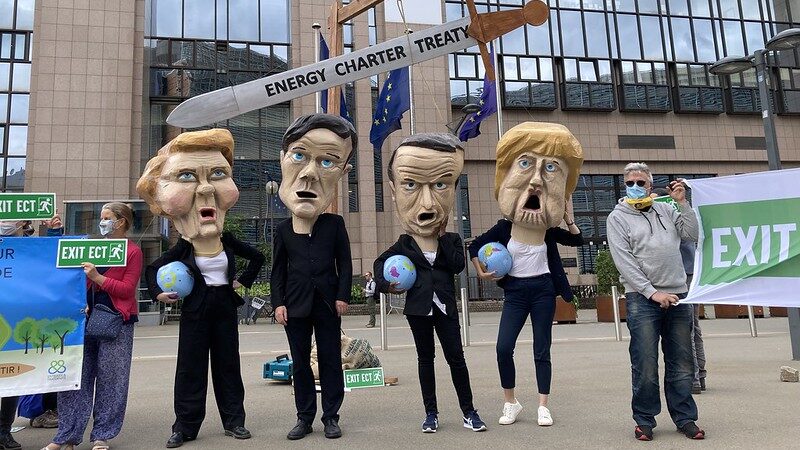Green reforms to a major energy treaty that has shielded oil and gas investments from climate regulation took a big step forward today, as the 51 governments of the Energy Charter Treaty (ECT) agreed to allow each other to remove protections for fossil fuels.
The vote is a victory for the European Commission’s four-year-long push – against opposition from Japan and Kazakhstan – to stop fossil fuel companies from using the ECT to sue governments over climate policies.
The reforms will start applying provisionally in nine months, on September 3, 2025, to governments that agree to it. But it must be ratified by three-quarters of all ECT nations to fully enter into force.
European climate campaigners said that governments should leave the ECT despite the reforms. “This treaty belongs to the past,” said Paul de Clerck, trade campaigner at Friends of the Earth Europe.
The key reform is a “flexibility mechanism”, which would give governments the power to end investment protection for fossil fuels while keeping protections for investments in renewables.
As part of a compromise between them, EU countries will use this power to end protection for new fossil fuel investments but continue protecting existing fossil fuel investments for ten years.
It is unclear how other ECT member states – like the UK, Switzerland, Japan and Central Asian countries – would use the new power.
While the UK and several EU countries have either left the ECT or are leaving, they are bound by its provisions for 20 years under the ‘sunset clause’. Despite leaving the ECT in 2016, Italy was forced to pay €190m ($200m) in compensation to a British company in 2022, after the country restricted offshore oil drilling.
Sued for climate action
The ECT was conceived in the 1990s to boost investment flows into energy between Western and post-Soviet countries. But its provisions to deter states from grabbing private assets have since been used by energy companies to fight back against climate policies.
In 2020, a British oil and gas company sued Slovenia over what it called “unreasonable” environmental protections”, while German energy company Uniper threatened to sue the Dutch government for €1 billion ($1.1bn) over its coal phase-out plans.
In lawsuits brought under the ECT last November, British oil company Kelsch is suing the EU, Germany and Denmark for at least 95 million euros ($102m) over a windfall tax on energy firms.
The European Commission reacted to these and other cases by attempting to remove fossil fuels from the list of investments protected by the ECT – with the aim that it would apply only to clean energy assets.
For two years, efforts by EU negotiators were repeatedly blocked by Japan and Kazakhstan. But in June 2022, a “flexibility mechanism” was agreed that would allow ECT states to end protection for fossil fuels, as long as no other ECT state objected.
Despite European Commission negotiators finally winning this right, by the time the annual ECT conference came around in November 2022, EU governments no longer unanimously backed the reforms the European Commission had negotiated, and so they were shelved.
The EU’s stalling on the reforms drew an angry response from then head of the ECT secretariat, Guy Lentz of Luxembourg.
In a letter to the leader of the European Parliament in February 2023, he warned that if the EU withdrew as a bloc before approving the modernisation, it would amount to “an express prohibition” for other ECT members to better align with the Paris Agreement on climate change.
Failure of Busan talks exposes fossil fuel barrier to UN plastics pact
He added that failure to agree reforms would essentially allow fossil fuel companies to sue EU states for longer because of an existing 20-year sunset clause, which means energy companies can bring lawsuits against governments for two decades even after a country leaves the treaty.
EU states wanted to neutralise this sunset clause by agreeing a side deal between themselves not to apply the treaty. But Lentz said these attempts “may not provide the expected legal certainty”. Campaigners accused him of “bluffing”.
EU divided
EU countries then continued to debate among themselves whether to stay in or leave the ECT and – if they withdrew – whether to modernise it before exiting.
Despite the ongoing talks, France, Germany and Poland officially left the ECT in December 2023. Luxembourg and Slovenia left in June and October 2024 respectively. Portugal, the UK, Spain and the EU will leave next year.
This debate was resolved in May 2024, with EU states’ ministers agreeing to a compromise, brokered by the Belgian government. Governments that want to can stay and support the modernisation, but the EU itself can start process of exiting right away.
This article was updated on December 4, 2024 after the Energy Charter Treaty secretariat confirmed that the modernisation had been approved. Previously, it cited a European Commission spokesperson saying the modernisation had been approved.
